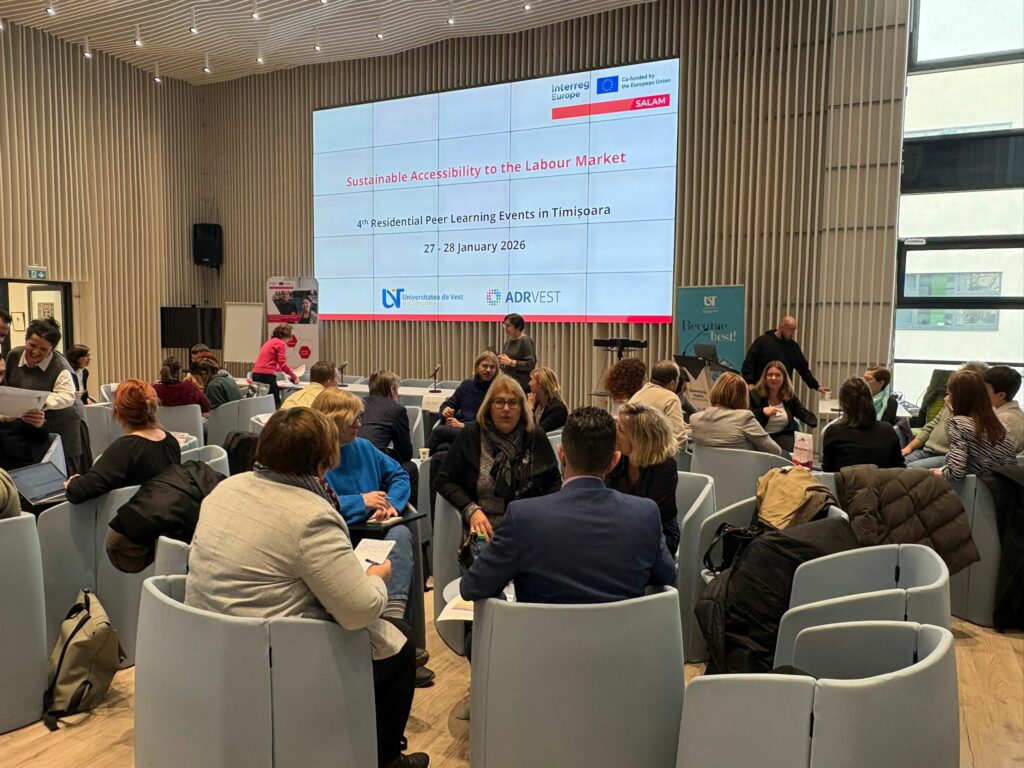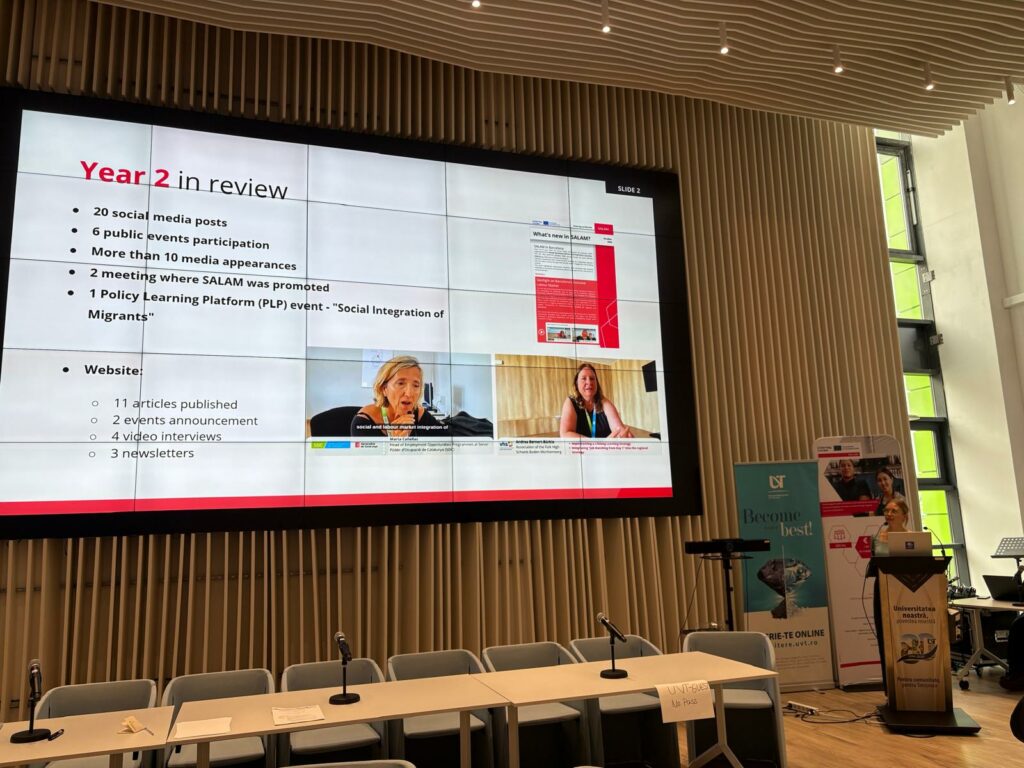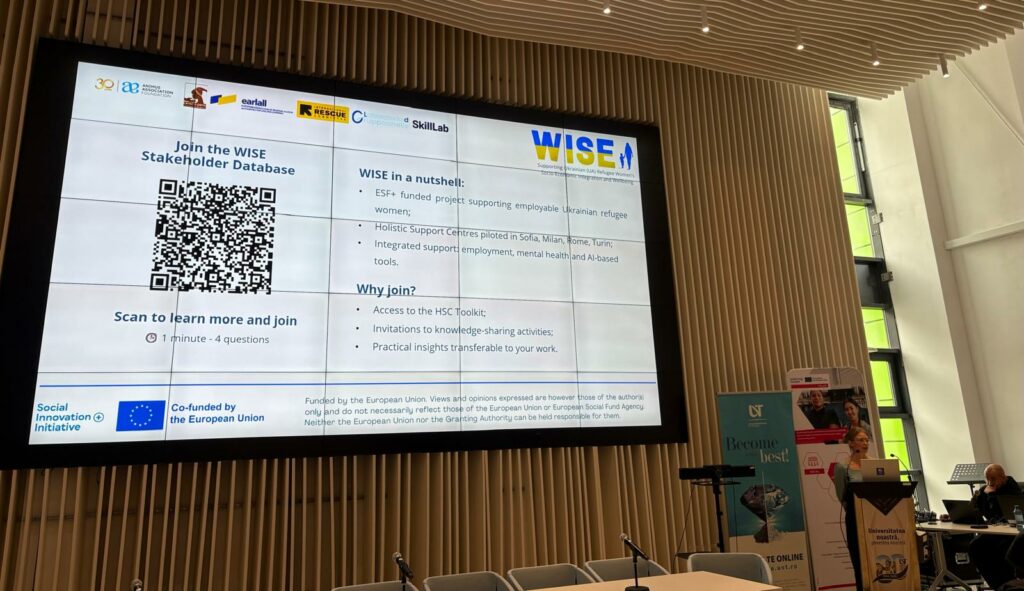On 25 February, ECORYS invited relevant organisations and stakeholders to join a focus group supporting the European Commission Directorate-General for Employment, Social Affairs and Inclusion’s study on the Skills Portability Initiative (SPI). EARLALL took part to advocate for the recognition of skills and to address upcoming challenges and policy developments at regional level.
The SPI aims to improve the use and recognition of skills and qualifications across EU Member States by supporting worker mobility, addressing labour shortages, and enhancing competitiveness. This focus group highlighted Action 1 of the SPI, which focuses on improving the transparency, usability, and cross-border portability of skills and qualifications. The aim of the focus groups is to discuss challenges, share best practices, and explore potential improvements in the portability and recognition of skills and qualifications, together with experts, organisations, and stakeholders.
The webinar explored current challenges and barriers affecting skills mobility for workers, learners, institutions, and employers. Attendees examined potential solutions for improving cross-border recognition, such as the use of digital credentials, and shared their experiences and perspectives regarding the portability and recognition of skills across Member States. Participants further emphasized that guidance for professionals and public employment officials is often limited, while systems for validation and recognition of skills remain fragmented. The discussion also highlighted the need for stronger alignment between national qualification frameworks (NQFs) and the European Qualifications Framework (EQF) as a key policy solution.
The focus group stressed the importance of recognizing prior learning (RPL) as a way to address existing challenges. It also underscored the value of maintaining and updating comprehensive NQF qualifications in alignment with databases linked to Europass, to leverage shared practices and inform EU-level policy options for enhancing skills portability.
As a dedicated network across Europe, EARLALL closely follows developments in recognized learning across borders to strengthen the international alignment of skills. By supporting initiatives and research that promote the recognition of skills portability,
As a dedicated network across Europe, EARLALL actively addresses developments in recognized learning within its Working Groups, contributing to the international alignment of skills. By supporting initiatives and research that promote the recognition of skills portability, the network can contribute to a more mobile and foster a more mobile and competitive European workforce.
On 23 February 2026, the European Commission hosted the second consultation webinar in the series shaping the future European Strategy for Vocational Education and Training (VET) 2026–2030. Entitled “Future-Proofing VET: Ensuring Quality and Responsiveness to Labour Market Needs”, the online meeting gathered over 115 participants, including social partners, VET providers, practitioners, public authorities and experts from across Europe.
Building on the first consultation dedicated to the international dimension of VET, this second session focused on a core question for Europe’s skills agenda: how to ensure that VET systems deliver high-quality learning while remaining agile and responsive to rapidly evolving labour market demands.
The webinar was opened by Ms Andrea Leruste, Deputy Head of Unit for Vocational Education and Training, Skills Portability at DG Employment, Social Affairs and Inclusion, who underlined the strategic importance of maintaining strong quality standards while enabling VET systems to adapt to the green and digital transitions. She emphasised that stakeholder input is essential to grounding the future EU VET Strategy in practical realities across Member States.
Discussions were structured around three key policy dimensions.
Strengthening basic skills within VET
Participants reflected on the growing challenge of uneven basic skills preparedness among VET entrants. Evidence presented during the session, including monitoring work from Cedefop, points to declining levels of literacy, numeracy and digital skills in several countries. This raises important policy questions about how VET programmes can reinforce foundational competences without diluting occupational specificity.
Participants exchanged views on balancing curriculum time, assessment approaches and financing responsibilities, while ensuring that learners are equipped for lifelong learning and adaptability in changing labour markets.
Empowering teachers and trainers as drivers of quality
A second focus area addressed the central role of VET teachers and trainers in ensuring both quality and innovation. Contributions highlighted common challenges across Europe, including ageing workforces, shortages in certain sectors, and fragmented professional development systems.
The discussion stressed the need for coherent frameworks for initial training, induction and continuous professional development, as well as stronger partnerships between VET providers and employers. Participants also pointed to the importance of making VET teaching careers more attractive and future-oriented, particularly in light of digitalisation and the increasing use of new technologies.
Enhancing responsiveness and system agility
The third strand of debate examined how VET systems can better anticipate and respond to emerging skills needs. Effective feedback loops between labour market intelligence, qualification design and curriculum updates were identified as key enablers of agility.
Examples from Member States, Centres of Vocational Excellence and employer associations illustrated approaches such as curriculum flexibility at regional level and strengthened work-based learning arrangements, including intercompany training centres that support SMEs in delivering high-quality apprenticeships. Participants emphasised that governance structures, employer engagement and robust quality assurance mechanisms are critical to combining flexibility with consistency.
Following working group discussions, participants reported back in plenary and reflected on how these insights should inform the future EU VET Strategy. Exchanges focused on the added value of European cooperation in supporting teachers and trainers, addressing basic skills gaps within VET systems, and strengthening mechanisms for anticipating and responding to labour market change.
As with the first webinar, this meeting forms part of a structured consultation process feeding into a synthesis report and subsequent policy discussions. The contributions gathered will help shape the evidence base and policy orientations of the forthcoming Communication on the future EU VET Strategy, expected later this year.
The strong engagement and diversity of perspectives confirmed a shared commitment across the VET community to ensuring that Europe’s systems remain both high-quality and future-proof.
On 17 February 2026, the Community on the Role of Cities and Regions in Fostering Apprenticeships met online for its first session of the year under the European Alliance for Apprenticeships (EAfA).
The Community is co-led by the EARLALL, Fundación Bertelsmann and the Metropolitan City of Rome — a partnership that highlights the growing role of regional and local authorities in shaping strong, inclusive apprenticeship systems across Europe.
For this first meeting of 2026, the Community joined forces with the Community on the Learning Mobility of Apprentices (led by Euro App Mobility) to explore apprenticeship mobility from a regional and municipal perspective.
The discussion focused on scaling up apprenticeship mobility and examining how cities and regions can contribute to achieving the EU’s 2026 skills and inclusion objectives.
Joining forces to boost apprenticeship mobility
Although apprenticeship mobility is expanding, participation remains limited, with only around 4% of apprentices benefiting from a learning experience abroad. Compared to school-based VET and higher education, mobility in apprenticeships remains less common and often more complex to organise.
Andreas Gabriel (Euro App Mobility) identified key challenges:
- Limited awareness among learners and companies
- Administrative burden for VET providers
- SME concerns about operational impact
- Difficulties in recognising learning outcomes
Yet the benefits are clear: mobility enhances technical and transversal skills, strengthens employability and increases the attractiveness of apprenticeship pathways — particularly for young people with fewer opportunities.
The exchange then continued on how regional and local authorities can play a decisive role by:
- Supporting VET centres with mobility coordination and training
- Providing complementary funding
- Facilitating recognition of learning outcomes
- Mobilising local businesses and employer organisations
- Leveraging international partnerships to foster cross-border cooperation
Strengthening cooperation between EAfA Communities was also identified as a key step to better align EU mobility objectives with territorial realities.
Spotlight on the Metropolitan City of Rome: Erasmus+ accredited plan
The Metropolitan City of Rome shared its experience in strengthening internationalisation within its VET centres, marking its first year of implementing an Erasmus+ accredited plan. With a strong focus on sustainability and inclusion, Rome is working to prepare students for emerging labour market opportunities while ensuring that learners with fewer opportunities are fully supported.
Their strategy includes mobility opportunities not only for students, but also for teachers, trainers and administrative staff — recognising that staff development is key to building long-term institutional capacity. Careful planning, monitoring and evaluation of mobility activities are central to their approach.
The Metropolitan City of Rome will host the next in-person meeting of the EAfA in June 2026, providing an opportunity to further deepen exchanges and strengthen cooperation among cities and regions.
Synergies with the QUEEN project
The discussion connects closely with the objectives of the QUEEN project (Interreg Europe), of which EARLALL is a part. QUEEN aims to improve regional policies to enhance the quality and effectiveness of apprenticeships across Europe.
Both initiatives underline the importance of strong regional governance, inclusive approaches and better connections between VET systems and local labour markets. Exploring synergies between the EAfA Community and QUEEN could further reinforce policy learning and cooperation on apprenticeship mobility.
As co-leader of the Community, EARLALL remains committed to ensuring that cities and regions are at the forefront of building high-quality, inclusive and internationally connected apprenticeship systems.
On 17 February 2026, EARLALL successfully held its 17th Academy session online, dedicated to the UNESCO Global Network of Learning Cities (GNLC). The session brought together members to explore how lifelong learning can drive sustainable local development.
The Academy combined a conceptual introduction with a practical case study.
In the first part, Edith Hammer, Programme Specialist at the UNESCO Institute for Lifelong Learning (UIL), presented the objectives, guiding principles and added value of the UNESCO Global Network of Learning Cities. She highlighted how the initiative supports cities worldwide in promoting inclusive lifelong learning policies and strengthening local governance.
The second part featured Cllr Kieran McCarthy, Member of Cork City Council and of the Irish Delegation to the European Committee of the Regions. Drawing on Cork’s experience as a recipient of the UNESCO Learning City Award, he provided a concrete example of how the Learning City approach is implemented in practice. His intervention illustrated how lifelong learning strategies can contribute to community engagement, skills development and sustainable urban growth.
The session offered both strategic insight and practical inspiration, reinforcing the importance of lifelong learning as a cornerstone for resilient and forward-looking regions.
On 12 February, EARLALL hosted an online meeting bringing together members of the EARLALL network and partner organisations to exchange best practices on inclusive labour market policies. The meeting responded to a strong interest expressed by the Norwegian region of Trøndelag in strengthening collaboration with European regions on approaches to recruiting and supporting people currently outside the labour market, including persons with disabilities.
Across Europe, regions are facing profound structural challenges: shrinking labour force, rising numbers of NEETs (young people not in Education, Employment or Training), and ageing populations across Europe. In this context, promoting inclusive labour market participation is not only a social responsibility but also an economic necessity. Ensuring that all individuals — particularly those with fewer opportunities — can access quality education, training and employment pathways is central to sustainable regional development and social cohesion.
Addressing Shared Demographic and Inclusion Challenges
Trøndelag presented the current state of its region with regard to the labour market, highlighting demographic challenges arising in the region. The region further discussed its aim to create international cooperation with partners at the regional level to gain inspiration on methods for systematic inclusion and on how to encourage employees to remain in the workforce.
With particular attention to vulnerable groups, the meeting explored various models and initiatives implemented across the EARLALL network to promote inclusive labour market approaches. Borås Stad in Sweden echoed the challenges identified by the Trøndelag region and reflected on their shared objectives. With an unemployment rate of approximately 7%, the municipality highlighted the need to upskill and reskill individuals with lower levels of formal education to maintain a highly skilled workforce. Borås Stad reaffirmed its commitment to increasing the employment rate, focusing on inclusive labour markets as a way to foster social integration.
Eli Zurutuza Ortega represented the association EHLABE from the Basque Country, dedicated to the social and occupational inclusion of persons with disabilities, stressed the transnational nature of these challenges, stressed the transnational nature of these challenges. Demographic shifts and labour shortages are increasing pressure on employment systems, often disproportionately affecting persons with disabilities. EHLABE showcased its work in raising awareness, influencing policy, and implementing inclusive employment models that provide coherent and flexible pathways into the labour market. As highlighted during the meeting, Eli Zurutuza Ortega made their guiding principle: “We adapt the work to the person, not the other way around.”
Representatives from Public Employment Services from Catalonia subsequently presented the ALMA programme, a European Commission mobility initiative supporting the integration of NEETs aged 18–29. The programme facilitates the social and professional integration of disadvantaged young people through mobility opportunities across EU Member States. While ALMA specifically targets youth, Catalonia also implements several complementary programmes focused on broader labour market inclusion.
This discussion closely aligns with EARLALL’s Regional Skills Partnership for Lifelong Learning Mobility, launched under the European Commission’s Pact for Skills. While mobility instruments such as ALMA represent one important tool to foster inclusion, the exchange primarily highlighted the crucial role of lifelong learning systems in supporting individuals who are currently outside the labour market. Strengthening upskilling and reskilling pathways, ensuring accessible and flexible learning opportunities, and developing inclusive regional skills strategies are key priorities shared across the network.
Strengthening Democratic Engagement and Social Cohesion
The exchange further reaffirmed EARLALL’s commitment to promoting democratic engagement, citizenship and social inclusion through lifelong learning. Inclusive labour market policies contribute not only to economic resilience, but also to social cohesion and active participation in society. Supporting NEETs, persons with disabilities, migrants and other vulnerable groups strengthens both regional competitiveness and democratic values. EARLALL will continue to facilitate dialogue, exchange of good practices and the development of joint initiatives to support regions in recruiting, retaining and empowering individuals currently outside the labour market.
How can Artificial Intelligence strengthen labour market policies at regional level?
This was the central question discussed during the recent EU Active Labour Market Policies Observatory (EU-ALMPO) project Launch Event, Harnessing AI in Supporting Labour Market Policy Making, which brought together representatives from the European Commission, OECD, CEDEFOP, research institutions, and policy practitioners.
For regions, the debate is particularly relevant.
Labour market transitions — driven by digitalisation, green transformation and demographic change — are experienced locally. Regional authorities and Public Employment Services are on the frontline of supporting workers through job transitions, upskilling pathways and inclusive employment strategies.
Key insights from the discussion:
- AI and Generative AI are already reshaping work organisation across sectors — regions must prepare proactively.
- Current evidence does not point to widespread job losses, but rather to task transformation and evolving skill requirements.
- Skills — not technology — are the main bottleneck. Investment in upskilling and reskilling systems is critical.
- Human-centred governance, transparency and trust must underpin the use of AI in labour market policymaking.
- AI can support better targeting, monitoring and evaluation of Active Labour Market Policies — if embedded within strong institutional frameworks.
As a partner in the TRAILS project, EARLALL is actively working on these challenges — supporting regions in anticipating skills needs, strengthening lifelong learning systems, and ensuring that digital and green transitions translate into quality jobs and inclusive growth. The discussions at the EU-ALMPO project event strongly resonate with TRAILS’ objective to bridge research, policy and practice in shaping resilient regional labour markets.
Ensuring that AI-driven tools reflect territorial realities and support regional policy implementation will be key in the months ahead. Cooperation between European initiatives, research institutions and regional stakeholders will determine whether digital transformation enhances both competitiveness and social cohesion.
The transition is underway — and regions have a central role in shaping it.
Registrations are now open for the Lifelong Guidance 5.0: Upscaling Guidance Services in Europe Conference 2026, taking place on 23–24 March 2026 at VHS Wiener Urania in Vienna, Austria. The conference “Lifelong Challenges: Transformations in Career Guidance and Counselling” will bring together guidance professionals, educators, researchers, and policymakers from across Europe to explore how educational and career guidance is evolving in response to digital, labour-market and societal change. The conference will be held in German and English.
About the Conference
Technological innovation, changing labour markets and wider societal developments are reshaping how guidance professionals support individuals throughout their careers. A key challenge moving forward is ensuring that people, particularly those in vulnerable situations, are not left behind by these rapid changes.
The Transformations in Career Guidance and Counselling conference provides a European platform to reflect on these developments. It will explore how guidance services can adapt to ongoing and future changes, and how digital tools and technologies can meaningfully complement — rather than replace — personal guidance approaches. Through keynotes, panels and interactive sessions, participants will exchange experiences, gain expert insights and discuss the future of guidance systems across Europe.
About the Lifelong Guidance 5.0 Project
The conference is organised within the framework of the Erasmus+ project Lifelong Guidance 5.0: Upscaling Guidance Services in Europe. The project supports guidance institutions in developing and implementing digital transformation strategies, with a particular focus on hybrid guidance models that combine face-to-face support with digital solutions.
Through quality development and capacity-building activities, Lifelong Guidance 5.0 aims to strengthen lifelong educational and career guidance services for diverse target groups. The conference contributes to these goals by creating a space for dialogue, reflection, and knowledge exchange among practitioners, researchers, and policymakers.
Programme Highlights
The conference programme features a keynote by Dr Britta Matthes from the Institute for Employment Research – IAB, titled “Career Guidance and Counselling: How Is the Professional Field Changing Through Digitalisation?” Drawing on her extensive research within the “Occupations in Transformation” group, Dr Matthes will examine how digitalisation is reshaping counselling professions, including questions around automation, efficiency gains, and the limits of digital tools in replacing human guidance.
Don’t miss out on the interactive panel discussions that will bring together policymakers and experts from chambers of commerce, labour market research and labour institutions to discuss ongoing social and labour market transformations. The panel will focus on the implications for counselling services and advisory institutions, the challenges faced by different target groups, and policy responses aimed at supporting particularly vulnerable individuals.
In addition, participants can choose from a wide range of sessions offered in both English and German, covering topics such as digital guidance methods, competence validation, company-based guidance approaches and outreach strategies for both young people and adults.
Registration and Practical Information
- Conference dates: 23–24 March 2026
- Venue: VHS Wiener Urania, Uraniastraße 1, 1010 Vienna, Austria
- Registration: https://lifelong-guidance.eu/lifelong-changes-registration/
- Accessibility and venue information: https://www.vhs.at/de/e/urania/kontakt
Please note: Registration will only be confirmed once participants receive a personalised confirmation email.
Registrations are now open for the International LCAMP Week & Open Days 2026, taking place from 21 to 23 April 2026 in Vitoria-Gasteiz (Basque Country).
The event will bring together vocational education and training (VET) providers, teachers, centre managers, students, and advanced manufacturing professionals to exchange experiences and practices related to Learning Factories and Industry 4.0 in vocational and higher vocational education.
LCAMP Conference 2026
The LCAMP Conference 2026 is the core event of the week. It focuses on the practical implementation of Learning Factories, digitalisation, and advanced manufacturing technologies in education and training systems. The programme will include workshops, practice-oriented sessions, and opportunities for peer learning and networking.
Call for Workshop Proposals
As part of the conference programme, LCAMP invites stakeholders to submit Workshop Proposals addressing innovative approaches, methodologies, and concrete implementations related to Learning Factories, Industry 4.0, and skills development.
Call for Workshop Proposals: https://ec.europa.eu/eusurvey/runner/LCAMP2026_Workshops_call
Student Hub 2026
Running in parallel with the conference, the Student Hub 2026 will provide dedicated activities aimed at enhancing student participation and international exchange.
Institutions interested in student involvement can contact:
international@tknika.eus or lcamp@info.eu
Registration, Programme and Practical Information
- Conference Registration Form: https://ec.europa.eu/eusurvey/runner/bbb524b4-885e-d0c7-2ec4-6fd16b411993
- Programme: https://lcamp.eu/conference-2026/
- Location: Vitoria-Gasteiz, Basque Country
- Dates: 21–23 April 2026
- Practical information: https://lcamp.eu/wp-content/uploads/sites/53/2026/02/LCAMP-Practical-Info-2026-Vitoria.pdf
Vitoria-Gasteiz offers a unique combination of a historic city centre, modern infrastructure, and excellent transport connections, making it an ideal setting for learning, networking, and collaboration.
We encourage participants to stay in Vitoria-Gasteiz for the full duration of the event to make the most of the LCAMP Week experience.
Participants are encouraged to stay in Vitoria-Gasteiz for the full duration of the event. The city offers a combination of historical heritage, modern facilities, and strong transport connections, creating an appropriate setting for international cooperation and professional exchange.
Further practical information, including venue details, accommodation options, and the final programme, will be shared with registered participants.
About the LCAMP Project
LCAMP (Learning Factories in Advanced Manufacturing Platforms) is a European cooperation project that supports the development and implementation of Learning Factories as innovative environments for vocational and higher vocational education.
The project aims to strengthen collaboration between education and industry, promote practice-oriented learning, and support the development of skills aligned with Industry 4.0 and advanced manufacturing.
On 3 February 2026, the European Commission hosted the first in a series of four consultation webinars dedicated to the future European Strategy for Vocational Education and Training (VET) 2026–2030, focusing on the international dimension of VET
The webinar brought together European associations, practitioners, social partners, VET providers and experts to reflect on priorities, challenges and opportunities for strengthening international cooperation in VET.
The event was opened by Ms Anna Banczyk, Head of Unit for Vocational Education and Training, Skills Portability at DG Employment, Social Affairs and Inclusion, who underlined the strategic relevance of VET internationalisation for Europe’s competitiveness, resilience and social cohesion. She highlighted the importance of grounding future policy orientations in practical experience and stakeholder input.
This webinar is part of a broader consultation process aimed at gathering structured input from stakeholders. Insights collected across the four webinars will feed into a synthesis report to be published in the coming months and will inform discussions at a dedicated workshop in Cyprus, organised in the margins of the informal meeting of Directors-General for VET in March. The overall process will culminate in the publication of a Communication from the European Commission on the future EU VET Strategy, expected in June 2026.
Setting the scene, Georgios Zisimos (European Training Foundation) emphasised that internationalisation should be understood as a comprehensive process, encompassing institutional capacity, appropriate tools, regulatory frameworks, and sustainable support structures. He highlighted in particular the critical role of local and regional actors in translating European objectives into effective practice on the ground.
The agenda structured discussions around three core areas: attracting skilled talent, improving VET systems through international cooperation, and fostering peer learning and exchanges of best practices with third countries and international organisations. Scene-setting contributions from national authorities, social partners and European VET organisations provided diverse perspectives, followed by interactive exchanges with participants.
Stakeholder input collected through registration questionnaires and live interactions pointed to a broad range of topics relevant to VET internationalisation. These included the implementation of micro-credentials, mobility and portability of learning outcomes, mutual recognition of skills and qualifications, upskilling of teachers and trainers, links with the Herning Declaration on Vocational Education and Training (VET), cooperation with third countries, talent attraction versus brain drain, and the alignment of VET with green, digital and circular transitions. Participants also highlighted persistent challenges such as fragmentation, skills mismatches, administrative and language barriers, sustainability of initiatives, and the need to reduce administrative burdens.
Overall, the webinar confirmed strong stakeholder engagement and a shared understanding that a reinforced international dimension of VET is essential for Europe’s future skills agenda. The contributions gathered will play a key role in shaping the evidence base and policy orientations of the forthcoming EU VET Strategy.
Call for evidence: open consultation
Commission launches call for evidence for new Vocational Education and Training (VET) strategy. The consultation is open until 19 February 2026. Read more
On 2 February 2026, EARLALL welcomed representatives from Trøndelag region (Norway) in Brussels. The delegation included teachers, guidance counsellors, Chamber of Commerce representatives and officials from the Trøndelag European Office. The meeting provided an opportunity to exchange perspectives on regional priorities and explore avenues for future collaboration.
EARLALL presented its mission as a European network supporting regions in developing inclusive labour market and skills policies. Emphasis was placed on EARLALL’s role in connecting areas across Europe and amplifying local needs at the EU level, ensuring that policy development reflects the realities on the ground. Participants learned about EARLALL’s capacity-building activities, including thematic Working Groups and the EARLALL Academy, as well as EU-funded projects such as QUEEN – Quality apprenticeships for evolving labour needs and SALAM – Sustainable AccessibIlity to the LAbour Market (Interreg Europe Programme), which focus on quality of apprenticeships, skills development and inclusion.
Trøndelag regional representatives shared their regional priorities, including aligning with Erasmus+ projects, bridging gaps between youth expectations and labour market realities, motivating young people and engaging businesses in smoother transitions into education and employment.
EARLALL then presented concrete examples from its member regions on how to organise effective collaboration between schools and businesses, drawing on experiences from Flanders Schools, the Catalan Department of Education’s implementation of the Dual System, TKNIKA’s work on innovation and skills ecosystems in VET in the Basque Country, and the Tuscany Region’s ITS Academy model. These examples also highlighted shared challenges across Europe—such as teacher shortages, demographic change, and skills mismatches—and demonstrated how regions are implementing practical, inclusive labour market initiatives while maintaining a strong international outlook.
The meeting concluded with a shared commitment to continue dialogue and explore concrete pathways for future initiatives, further exploring how collaboration with other European regions could support Trøndelag in developing inclusive and sustainable labour market solutions. EARLALL looks forward to deepening collaboration with the Trøndelag Region, connecting regional priorities with European networks to develop sustainable solutions in lifelong learning and skills development.
EARLALL participated as a communications project partner in the 2nd online mutual learning event organised by the European Competence Centre for Social Innovation, within the Call Innovative Approaches to Mitigate the Societal Consequences of Russia’s War of Aggression against Ukraine within EU Countries. EARLALL participated in the exchange of practices and lessons learned through its involvement in the WISE – Supporting Ukrainian Refugee Women’s Socio-Economic Integration and Wellbeing project.
The event built on the momentum of the first event held in May 2025 and brought together project partners and beneficiaries to share experiences, reflect on lessons learned and explore strategies to ensure sustainability beyond project implementation.
Promoting Peer Learning and Long-term Impact
The event was opened by Ina Sinkevičiūtė, Project Team Lead at the European Competence Centre for Social Innovation, who reiterated the core objective: to create spaces for peer learning, knowledge exchange and long-term actions beyond project implementation. The session emphasised the importance of collaboration in transferring social innovation practices and fostering inclusive solutions for people who have fled Ukraine.
Aurélien Mornon Afonso from DG Employment, Social Affairs and Inclusion at the European Commission, continued on Sinkevičiūtė intervention by highlighting the European Commission’s priorities in defending Ukraine’s sovereignty. Further stressing the relevance of initiatives advancing social cohesion and resilience across EU member states —objectives that are closely aligned with EARLALL’s mission and its engagement in the WISE project.
Overview and aim of the Call
Laura Puciataitė, Project Coordinator at the European Competence Centre for Social Innovation, presented an overview of the Call, underlining its aim to support transnational projects that transfer and upscale social innovation. The call focuses on initiatives that contribute to integration and inclusion of people who have fled Ukraine while mitigating broader societal challenges, such as energy crises and poverty, focusing on target groups such as women, youth and vulnerable groups. In this context, EARLALL contributes to the Call’s objectives through the WISE project, which takes a holistic approach to supporting Ukrainian refugee women. WISE focuses on three interlinked areas
- Economic integration and labour market access, through language skills development, empowerment hubs and life skills training.
- Social and community integration, promoting inclusion via community, cultural orientation and peer support.
- Mental health and well-being, by strengthening resilience through trauma-informed psychosocial and mental health support.
Insights on Migrant Intergration
Insights from Erika Borg, Thematic Expert of the ESF+ Community of Practice on Migrant Integration, further reinforced the relevance of WISE. Borg highlighted demographic changes and displacement patterns, noting that women are the majority of individuals under Temporary Protection Status in the EU, highlighting the disproportionate impact of the war on women and vulnerable groups.
In line with the call’s objectives, Borg emphasised that, since July 2025, the European Commission has enabled Ukrainian NGOs, public authorities, and companies to apply for ESF+ funding. This funding supports projects aimed at improving labour market participation and skills development —areas directly addressed by the WISE project.
As a European network, EARLALL remains committed to resilient and sustainable societies. Through the WISE project, EARLALL can demonstrate a holistic approach by addressing multiple dimensions of refugees’ realities. Ultimately, continuing supporting integration of Ukrainian refugees through trauma-informed centres, socio-economic empowerment and well-being.
On 27–28 January 2026, EARLALL took part in the 4th Residential Peer Learning Event of the SALAM – Sustainable Access to the Labour Market (Interreg Europe) project, hosted in Timișoara, Romania.
The two-day meeting brought together project partners, public authorities, universities, institutions responsible for migration management, employment and labour law enforcement, as well as NGOs and migrant beneficiaries.
EARLALL members participating in the event included Centre-Val de Loire, Västra Götaland, Tuscany, Catalonia and Baden-Württemberg, together with associated member Borås Stad.
The event provided a valuable platform for policy learning, peer exchange and dialogue on how to strengthen sustainable solutions for the integration of migrants into local labour markets.
Opening and strategic perspectives
The transnational meeting opened at the Timiș County Council and was moderated by Mr Marius Niculae (West Regional Development Agency – West RDA), who underlined the global relevance of migration and the impact of demographic change on labour markets, stressing the responsibility of public institutions to actively engage across governance levels.
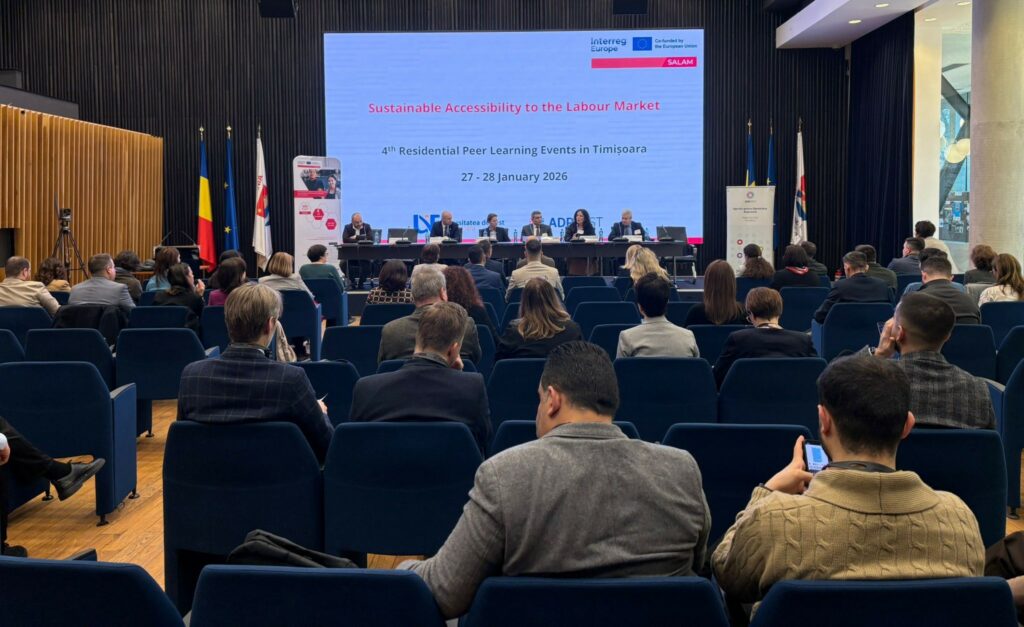
Mr Adrian Mariciuc, Deputy Director General of West RDA, highlighted migration as both a challenge and a development opportunity, emphasising the role of regional authorities in connecting stakeholders and creating dialogue to translate migration into socio-economic value. Ms Liliana Oneț, Deputy Prefect of Timiș County, stressed that SALAM meetings strengthen regional efforts towards sustainable migrant integration, contributing to social cohesion and community development. From a national perspective, Mr Tiberiu Giurea, Inspector General of the General Inspectorate for Immigration, highlighted the importance of migrants’ access to the labour market in addressing labour shortages and referred to Romania’s ongoing work on the European Migration and Asylum Pact.
The role of universities, regions and European initiatives
Mr Mădălin Bunoiu, Vice-Rector for Research at the West University of Timișoara, underlined the role of universities as spaces for learning, inclusion and future-building, noting population decline, skills shortages and the need for closer cooperation between universities, public authorities and NGOs.
Prof. Francesca Torlone (University of Florence), SALAM Project Coordinator, emphasised that SALAM enables regions and municipalities to improve skills frameworks and migrant inclusion through cross-regional exchange and concrete, place-based action.
Regional and European perspectives were further enriched by Mr Paul Opriș-Sîrca (West RDA), who presented actions aligned with the Talent Booster Mechanism (European Commission), and by Mrs Bianca Tătaru, who highlighted synergies between SALAM and the FutureECOS Interreg project in improving living conditions and labour market inclusion for migrants and NEETs.
Evidence, practice and voices from the ground
Research insights were presented by Mr Anatolie Cosciug (ICAM, West University of Timișoara), showing Romania’s growing role as a migrant destination and increasing mobility trends, alongside data on migrant demographics and labour market dynamics. Together with Mr Marius Matichescu, findings highlighted generally positive local perceptions of migrant integration in Timișoara.
An interactive dialogue showcased good practices in migrant socio-cultural integration, with contributions from LOGS – Social Initiative Group, the Ecumenical Association of Churches in Romania, and the Department of Social Assistance of Timișoara Municipality, complemented by voices of migrants sharing first-hand experiences of integration and access to employment.
Study visits, governance and next steps
The first day concluded with transnational study visits to LOGS – Social Initiative Group, a SALAM Romanian Good Practice, and the Emergency Transit Centre for Migrants in Timișoara, established by the Government of Romania, UNHCR and IOM. The Centre is currently the only fully operational facility of its kind worldwide, providing temporary accommodation for refugees in urgent need of relocation.
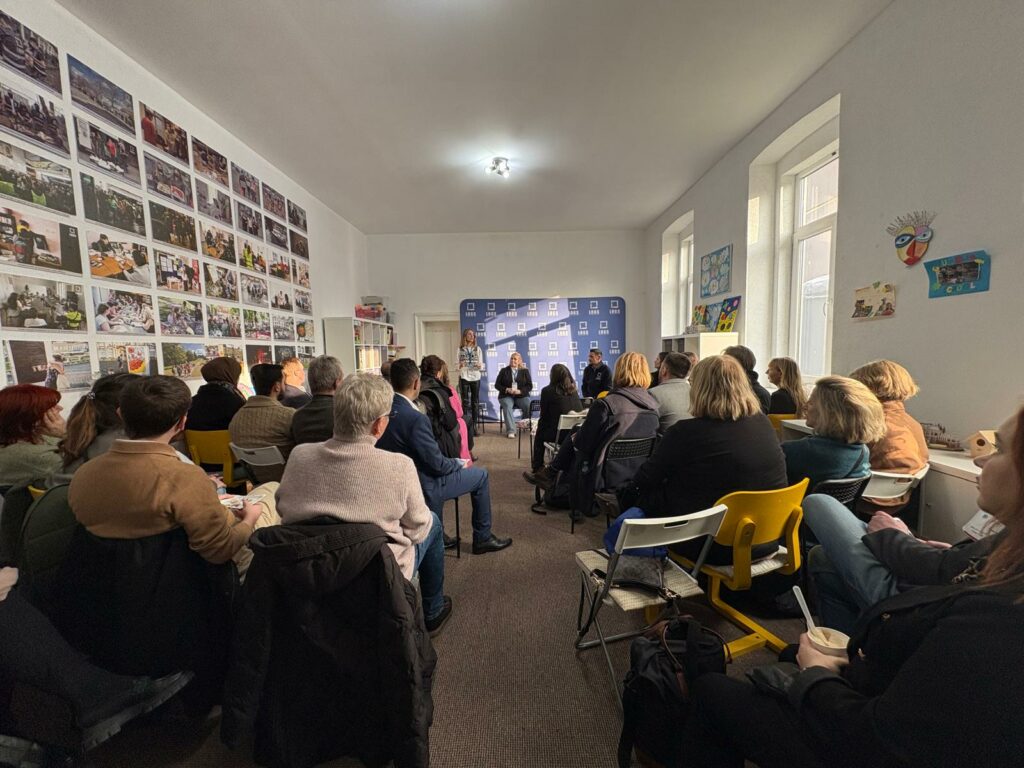
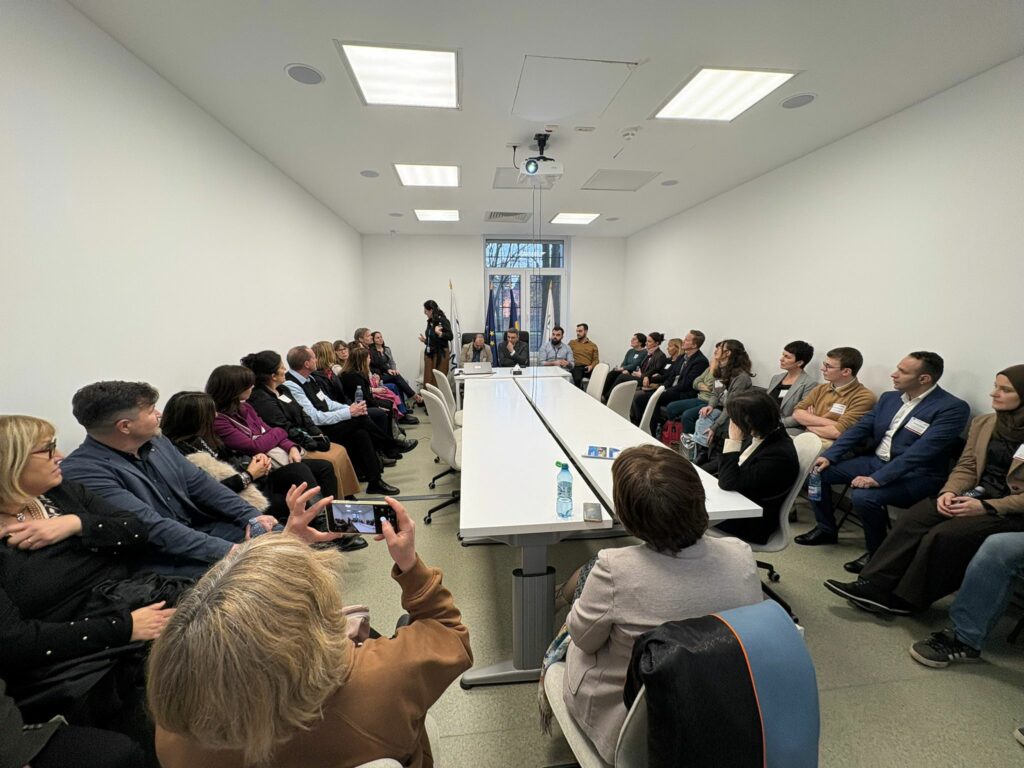
The second day focused on bilateral exchanges on SALAM policy instruments and the 4th Steering Committee Meeting, addressing pilot actions, project progress and upcoming milestones, including the mid-term review in February 2026.
During the meeting, EARLALL presented communication updates, invited partners to join the WISE Stakeholder Database, and highlighted synergies between SALAM and WISE project in promoting inclusive labour market integration.
The event concluded with a look ahead to the next SALAM Mutual Learning Event in Sweden in June 2026.
